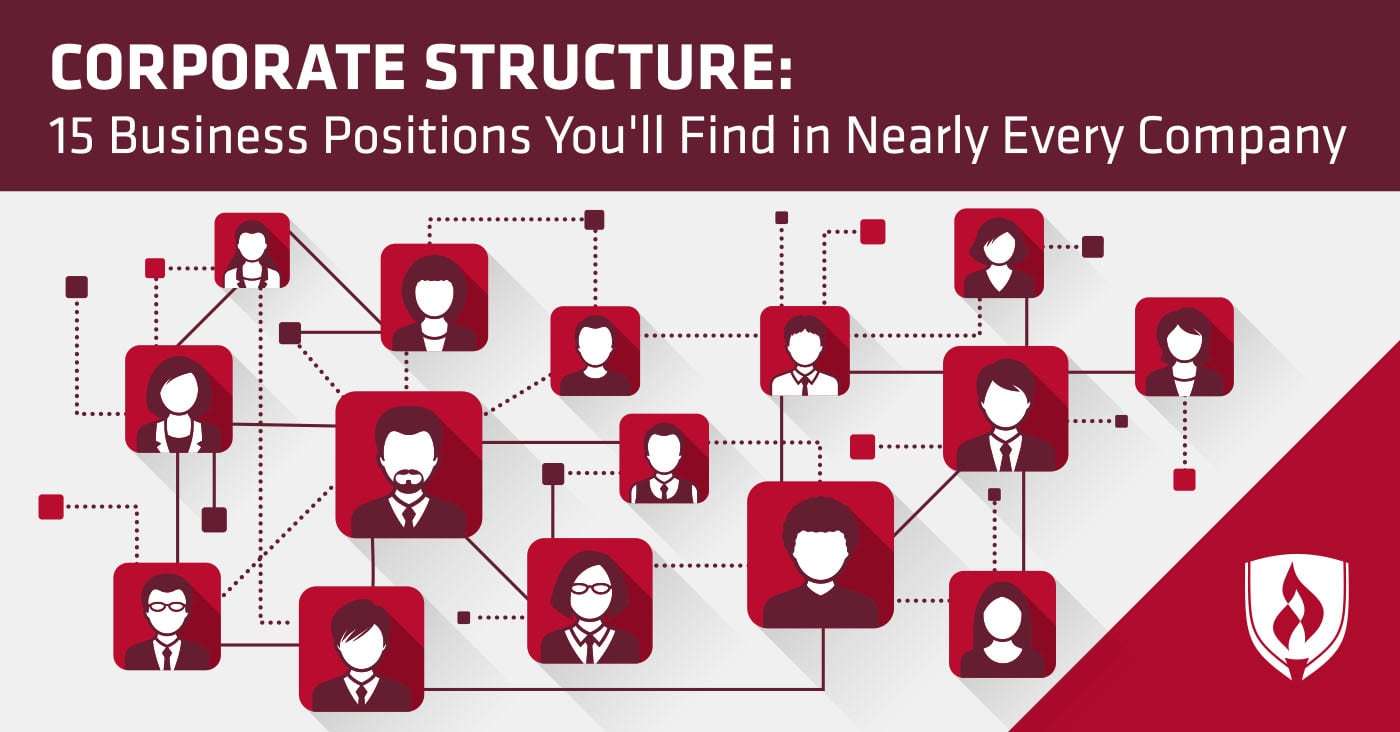Corporate Structure: Breaking Down 15 Business Positions You'll Find in Nearly Every Company
By Ashley Brooks on 12/10/2018

The business world is a mystery you’d love to solve. It’s fascinating to think of all the talented individuals that keep companies of all sizes running smoothly—but there’s a lot you don’t know about what those people do. You know there must be more business positions than just the vague “manager” job title. So what’s out there? While we can’t speak for every business, most follow a relatively uniform corporate structure with common major focus areas and departments.
It’s time to dig deeper into these focus areas so you can see for yourself what business positions are available to you. One of them might pique your interest enough to become the next step on your career path!
We’ve broken down 15 business positions that exist nearly every company in every industry. These essential careers make up the inner workings of corporate structure and keep the business world going ‘round. Read on to discover the many business career options that await you!
15 Business positions you’ll find in nearly every company
It can feel overwhelming to sort through piles of business job titles that are all unfamiliar to you. We’ve organized these business positions by department for easy reference. Now all you have to do is find your area of interest and start reading to discover a career that could be a great fit for you.
Marketing jobs
Marketing manager
These managers are in charge of all marketing efforts in an organization. Their main role is to spread the word about the products and services their company offers. Marketing managers plan promotional campaigns to generate interest in their company, and they supervise a team of specialists who carry out individual marketing tasks.
Marketing specialist
These individuals take direction from the marketing manager as they work to plan, implement and evaluate marketing campaigns. Many marketing specialists will have an area of expertise, such as social media marketing, graphic design or sales copywriting.
Market research analyst
Market research analysts use research and data to predict market trends and help their company plan their next marketing moves. They use their analytical prowess to interpret data and advise marketing managers of the company’s current marketing position. Their findings help drive the direction of the marketing team’s efforts.
Finance jobs
Financial manager
Financial managers use technology to monitor a company’s cash flow and other finances. They analyze, review and interpret data so they can help company leaders make informed financial decisions. Along with strategically planning the financial future of their company, they also oversee other finance professionals in their workplace.
Accountant
Accountants evaluate a company’s financial documents to ensure they’re complying with regulations and are paying the correct amount in taxes. They also run reports and advise company leaders on ways to decrease expenses and improve profits. There are many accounting specialties to consider, including public and private accountants, government accountants and auditors.
Budget analyst
These valuable members of the finance team are responsible for helping companies develop balanced budgets. They work with managers and executives to determine how much money to allocate to each department, and they estimate a company’s future budget needs.
HR jobs
Human resources manager
HR managers direct a company’s administrative functions, from overseeing the recruiting and hiring of new employees to collaborating with executives about the organization’s strategic future. They serve as liaisons between the management team and other employees, and they’re available to help employees navigate work-related problems such as choosing a benefit plan or resolving a dispute.
Human resources specialist
HR specialists serve under the HR manager to perform specific administrative tasks for a company. Many HR specialists will have an area of expertise, such as payroll, benefits administration or employee relations. Others will be generalists who assist in all areas of human resources—often this distinction comes down to the size of the organization you work for. Small organizations tend to rely on generalists, while bigger companies have more specialized HR focus areas and teams.
Recruiter
These HR specialists are pros at finding and hiring new talent to join their company. They work with the HR manager to identify open positions, create accurate and enticing job postings, review resumes and interview qualified candidates. They may also extend their search to in-person job fairs or college campuses.
Operations jobs
Industrial production manager
These managers oversee daily operations in manufacturing plants and similar work environments, such as distribution facilities. They ensure that workers are meeting safety requirements, that production stays on schedule and that equipment is running properly. They also look for ways to increase efficiency and reduce production costs. In nonindustrial environments, production and operations managers are tasked with similar objectives—making sure the product, service or widget is delivered on time, correctly and as efficiently as possible.
Supply chain manager
These professionals are focused on the production and distribution of products, from acquiring necessary inventory to shipping finished products to customers. They oversee the supply chain process to ensure there is always enough inventory available and to keep production costs low.
Buyer
Buyers are in charge of acquiring the products their company needs to do business. They review and approve vendors, compare prices and product quality and negotiate purchase contracts. Buyers are also tasked with keeping accurate reports for inventory and cash flow purposes.
Information technology jobs
Computer and information systems managers
These IT managers are the bridge between a company’s needs and the technology that’s required to meet them. They direct everything related to tech in a company, from installing and configuring new systems to collaborating with business leaders about ways to improve the company’s network.
Network and computer systems administrator
Computers are part of nearly every company today, and these IT pros are the valuable employees who keep all that tech up and running. IT administrators oversee all aspects of a company’s network systems, including determining their network needs, maintaining and updating equipment, evaluating system performance and facilitating tech support for employees.
Database administrators
Database administrators, or DBAs, use their technical know-how to develop and oversee an organization’s databases, which are necessary for storing information on finances, customer information and more. Their day-to-day job duties include maintaining databases, addressing security concerns and preventing data loss.
Is the corporate world calling you?
Don’t stand on the outside looking in at the business world you’ve been dreaming of. Now that you have a better understanding of corporate structure and the common roles you’ll find within, you have the information you need to go further in exploring the business positions that could be right for you.
But before you start firing off resumes—remember, the first step into the business world is typically earning a relevant degree. Learn more about degree options and how to choose the one that’s right for you with our article, “The Beginner’s Guide to Different Types of Business Degrees.”
Related Articles:




